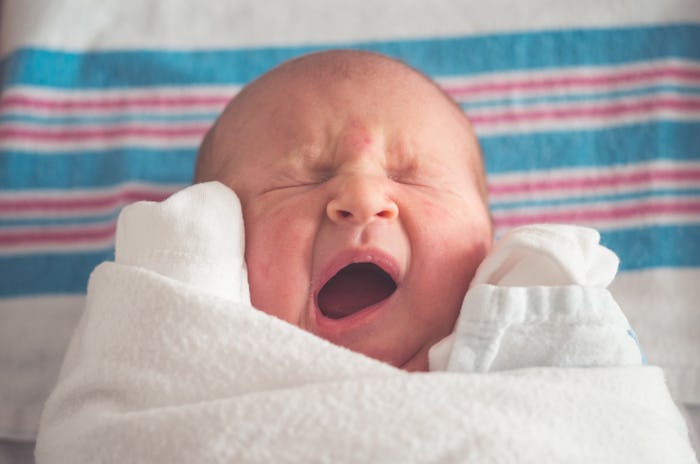If you were to ask a group of new parents what was on their wish list, I'd make a solid bet that sleep would be the top request. That's not to say that you'll never feel rested again, of course. But you can definitely expect your schedule to change a bit once you have a newborn. So you might be wondering how much sleep you actually need on your first night home with baby. Obviously every one — parent and child alike — is different, but there seems to be a general guideline when it comes to the amount of rest new parents need.
As it turns out, a lot depends on both you and your baby. According to the Baby Sleep Site, newborns sleep between 15 and 18 hours total, but they do so in one to two hour bursts instead of one long stretch. So even though your baby is literally sleeping more than half the day away, you're still probably getting up every couple of hours to feed, soothe, and change your little one. Since you'll probably be getting your rest in chunks, too, exactly how much sleep do you need to function on your baby's first night home?
According to the National Sleep Foundation (NSF), the recommended amount of sleep an adult should get is between seven and nine hours. However, the NSF did note that, while it's not optimal, an adult can still function on six hours of sleep — anything under that is not recommended, though. But reality doesn't always match up with expectation. As physician and sleep specialist Dr. William C. Dement told Health Day, "parents of newborns often lose about two hours of sleep per night until the baby is 5 months old." And this is where the whole "everyone is different" thing comes into play.
If you're used to getting nine hours of sleep a night, then losing two isn't necessarily the end of the world since you would still fall within the recommended guidelines from the NSF. But, if you typically only sleep for seven hours, then on the first night home with your newborn, you could be falling below the NSF's recommended line. That's why neuroscience researcher Dr. Margaret Moline told Parents that you can compensate for lost sleep by napping during the day, either while your little one naps or when someone steps in to give you a break. The first night at home may be full of unexpected challenges, but just remember that you'll find your groove before you know it. If you're ever feeling concerned about your sleep or ability to function, don't hesitate to reach out to your physician.
